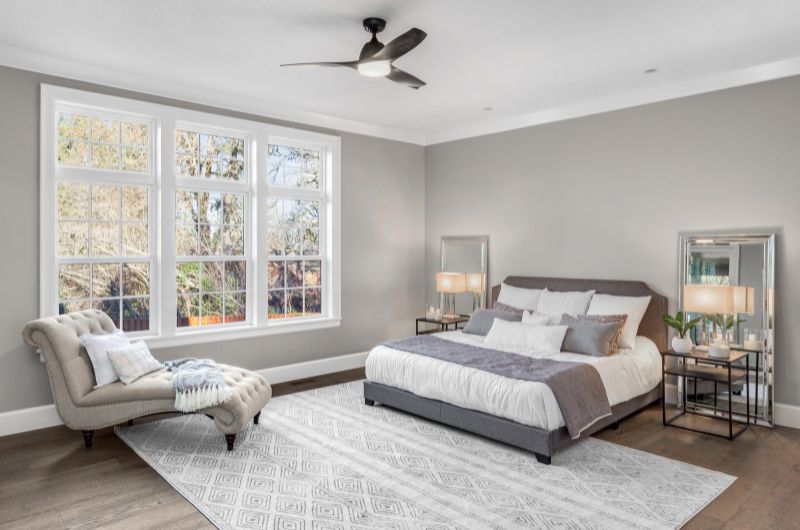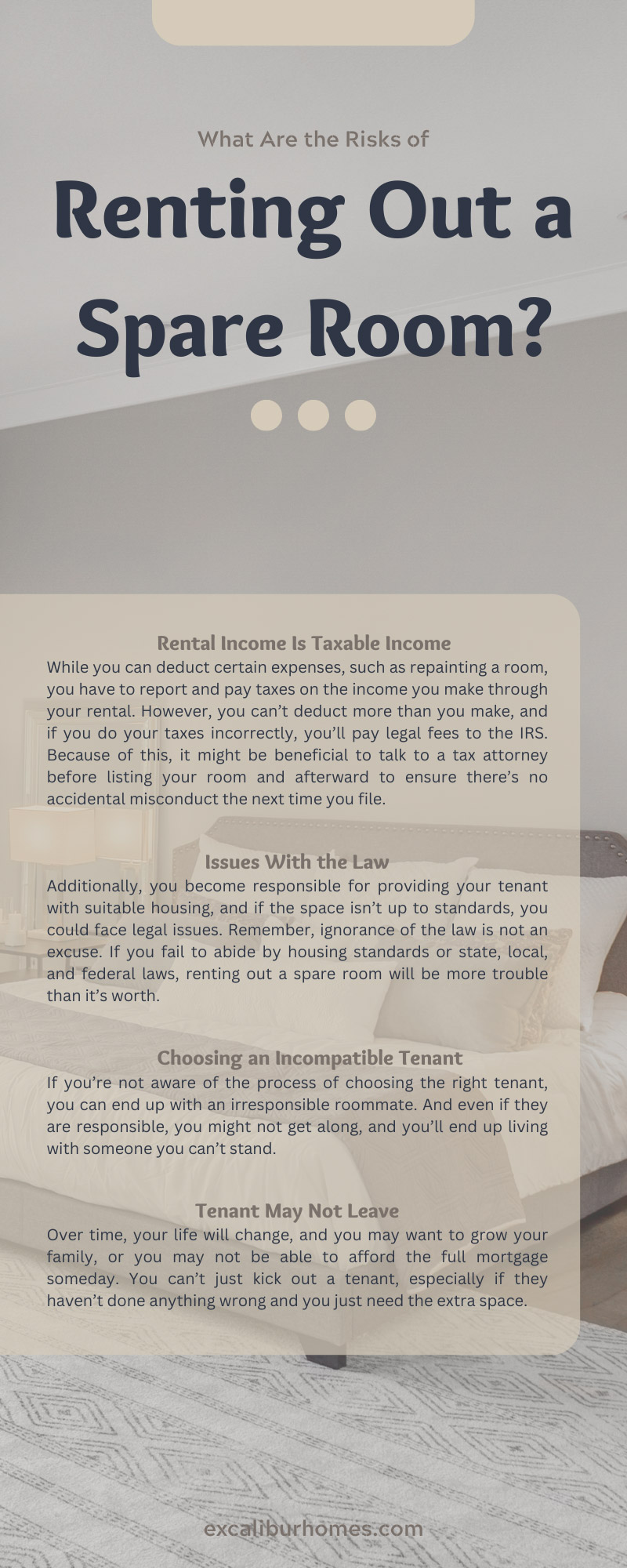
For homeowners who have the extra space, it may seem like an excellent idea to rent out a spare room to make some extra cash. This choice can also make more expensive homes become more affordable, as you’ll have help paying the bills.
While this may seem like the perfect situation, there are some risks associated with it, and you need to know what you’re getting into before you make this choice. Read on to review the risks and benefits of renting out a spare room and some tips to help make your life easier if you decide to rent out.
The Risks
Rental Income Is Taxable Income
Many people who want to start renting out a spare room look forward to pocketing the extra cash because it doesn’t have to go through taxes. This, unfortunately, isn’t true.
While you can deduct certain expenses, such as repainting a room, you have to report and pay taxes on the income you make through your rental. However, you can’t deduct more than you make, and if you do your taxes incorrectly, you’ll pay legal fees to the IRS. Because of this, it might be beneficial to talk to a tax attorney before listing your room and afterward to ensure there’s no accidental misconduct the next time you file.
Issues With the Law
Accidentally breaking tax laws isn’t the only legal issue you can run into. Being a property owner of any size requires a lot of legal knowledge. Some cities or HOAs won’t allow you to take on a broader lease, and if you’re already renting, your proprietor may not allow you to sublease.
Additionally, you become responsible for providing your tenant with suitable housing, and if the space isn’t up to standards, you could face legal issues. Remember, ignorance of the law is not an excuse. If you fail to abide by housing standards or state, local, and federal laws, renting out a spare room will be more trouble than it’s worth.
Choosing an Incompatible Tenant
If you’re not aware of the process of choosing the right tenant, you can end up with an irresponsible roommate. And even if they are responsible, you might not get along, and you’ll end up living with someone you can’t stand.
Additionally, some tenants will damage the property, whether due to accidental fires or theft from forgetting to lock a door. In some worst-case scenarios, your tenant could steal from you personally or vandalize your property, and you may even have to take them to court.
Tenant May Not Leave
Over time, your life will change, and you may want to grow your family, or you may not be able to afford the full mortgage someday. You can’t just kick out a tenant, especially if they haven’t done anything wrong and you just need the extra space.
On the other hand, a tenant may refuse to pay rent while continuing to live there. While you can evict them, eviction proceedings take a long time and can be strict, leaving you to wait on proceedings and live with them all the while.
The Benefits
Extra Income
While you will have to report the extra rental income on your taxes, that doesn’t mean you won’t be making any extra money. Any income that you’re not using to maintain the property and provide a suitable living space goes into your pocket.
You can use this to help pay off the mortgage or put it toward renovation goals. If you budget correctly, you can end up making a decent amount of extra money to help with expenses.
Help With the House
One of the main reasons why people want to rent out a room in the first place is to have an extra set of hands to help pay for the house. This option helps many people afford housing that they wouldn’t have been able to afford on their own.
Additionally, if you go on vacation or have to leave the house, you can plan around your tenant and make sure someone else is home. With extra people in the home, you don’t have to worry as much about security issues so long as it’s someone you know you can trust.
Good for Beginners
Renting out a spare room can be a fantastic option for those who are looking to break out into the property management business. In renting out a spare room, you don’t have to worry about flipping the property yourself or having to drive back and forth from your home to the other property. It can also be an easy way for you to gain experience and start understanding the law from the comfort of your own home. And because you can craft individualized contracts, it’s much easier to set specific expectations for your tenant to ensure you’re living with a compatible person.
Tips for Renting Out a Spare Room
Decide on a Short-Term or Long-Term Lease
Before you start crafting an airtight lease, you must decide what kind of lease you want to set. Depending on your preferences, you might choose one over the other. Short-term leases are great for beginners as there isn’t as much commitment, and you can even use the spare bedroom as a vacation rental space.
Long-term leases make it easier for you to build a relationship with your tenants and can provide long-term income. However, be sure to set healthy boundaries as they will be sticking around longer.
Write a Detailed Lease Agreement
You need a detailed and clear lease agreement to cover all your bases and protect yourself from legal issues. For example, you’ll want to run a background check on your applicants before you decide on a tenant, and you need to have their signature to do so legally. You may also want to include a security deposit and possibly require renter’s insurance if you’re concerned about property damage.
You should also consider including a pet clause, a maintenance responsibility clause, and any other specifications you deem necessary to protect your and your property. Remember, the more concise and specific your agreement, the less you’ll have to worry about running into disagreements and legal issues. Communication and documentation are key.
Check Local and State Legal Conditions
As stated previously, being a property owner requires extensive knowledge of the law, but that doesn’t mean knowing federal law is enough. You must be intimately familiar with state and local laws to be successful and save yourself from unnecessary litigation.
For example, some states don’t place a cap on how much of a security deposit you can charge, while other states do. Additionally, some states and cities have a specified amount regarding how much you can raise rent per year. Knowing these specific stipulations helps protect you, your property, and your tenant.
Being aware and familiar with the risks and benefits of renting out a spare room is an important first step. If you’re still not comfortable starting all on your own, Excalibur Homes is a rental management company in Decatur that’s here to help you. Whether you need help managing your properties, assistance with leasing, or expert advice, we’re here to make your life as a property owner easier.



